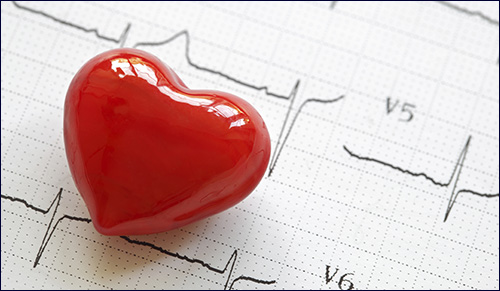 Vampire Weekend's Surprising Jewish Stories
Vampire Weekend's Surprising Jewish Stories


5 min read
Tests somehow missed my severe heart blockage. I was living on borrowed time.
I am not fat, I eat right, I exercise daily, I don’t smoke, my cholesterol is low and I don’t have a family history of heart disease. I have a successful career, became a proud bubby not once, but twice in the past year and a half, am active in my synagogue and enjoy many hobbies. I have no plans to die anytime soon. Yet recently, I almost did.
For months I was walking around with undetected heart disease that by all doctors accounts should have caused a fatal heart attack. I feel compelled to tell my story because it might save lives.
The main risk factors for heart disease are high blood pressure, high cholesterol, diabetes, tobacco use, family history of heart disease, sedentary lifestyle, and obesity. I have none of these risk factors. So when my chest pains started six months ago, my doctor told me she couldn’t imagine it would be heart-related. To be safe, she ran all the recommended stress tests, ECG, pulmonary test, blood tests, even upper endoscopy. As expected, no impaired function of the heart was detected. The working hypothesis was that I had mild heartburn.
Reassured, I altered my diet but not my schedule, pushing through the shortness of breath and tightness in my chest that would come and go in waves, especially when I exerted myself. For months, I knew something was wrong, but we had ruled out heart problems so I tried not to worry too much. I tried meditation to help me sleep, anti-anxiety medication in case stress was a contributor, hypnosis because why not, and a stricter diet. But nothing helped. Months went by.
One day in October I was taking care of my 2-year-old grandson for the afternoon. Carrying him up a flight of stairs, I was overcome by the debilitating pain of the worst episode I’d ever had. On the brink of collapse and unable to breathe, I sat down and leaned on the stairs, holding on to my grandson, and began to pray that I wouldn’t die there leaving the baby to fend for himself with no one around. After some minutes, the pain subsided and my breathing stabilized.
But my fear had doubled. For the first time, I felt my life was in danger and no one could determine the cause. I heeded my friend’s advice to see her cardiologist, even though I had passed all the heart exams recommended only months before.
To our surprise, the cardiologist immediately informed us that the exams I was previously given are only 60% accurate at detecting heart disease in women. He strongly recommended a CT Angiogram, which revealed that I had a complete blockage of the LAD artery, known as the “widow maker” for its disproportionate role in fatal heart attacks in men. The condition is less common and much more difficult to detect in women, though no less deadly. A catastrophically low amount of blood was reaching my heart and the blockage needed to be cleared immediately.
While my condition was severe, the procedure I had needed all along is rather routine these days, thanks to modern medical technology. An angiogram and implanted stent cleared the blockage completely. I did not spend the night in the hospital. My symptoms have not returned.
In the follow-up exam a few days later, the doctor expressed his profound surprise at having discovered any blockage given my lack of risk factors and my normal exam results. He said that with a blockage that severe, I should have had a fatal heart attack many months ago. I asked him if he had an explanation for why that didn’t happen. The cardiologist answered with one word, “God.”
It turns out heart attacks are the leading cause of death for women my age (59) in America. I don’t think many of us realize that. (I know I didn’t.) More important, the common tests for detecting blockages are unreliable in women! Women, take note. My heart disease only showed up with the CT Angiogram.
I am not an observant Jew, but I do attend Shabbat services on a regular basis. I went to morning services the Shabbat following my procedure, and during the Shemoneh Esrei when we got to the Modim Anachnu Lach – the blessing acknowledging our debt of gratitude to God, I experienced an intense emotional and spiritual connection to the words for the very first time. I felt overwhelming gratitude to be alive. I had a new appreciation for the prayers and how their purpose is to facilitate spiritual growth. It’s not always easy to relate to the same prayers each week, but I learned how a personal experience could bring new meaning to the words. I take new comfort in the Jewish rituals we have in place to help us through life’s challenges and I feel more grateful to be a Jew.
For many years now, it has been my practice, to wake up each morning and say the Jewish morning blessings, which help me to appreciate my multitude of blessings. Given my close call, I have decided to add another Jewish ritual to my life by reciting the Shema prayers before I go to sleep. It is good to frame my day with thoughts of God and gratitude.
Life is indeed, very fragile. We truly don’t know what each day will bring and we don’t know which day will be our last. I could have had a major heart attack. I feel God talking to me, telling me to go deeper. I feel a deepened sense of joy that I am still here, living, breathing, being.
